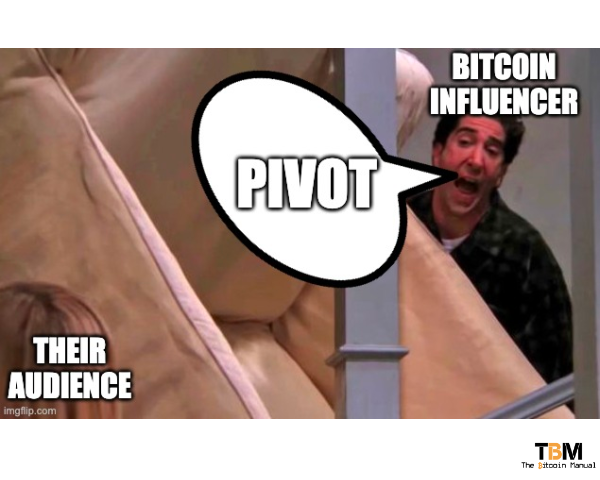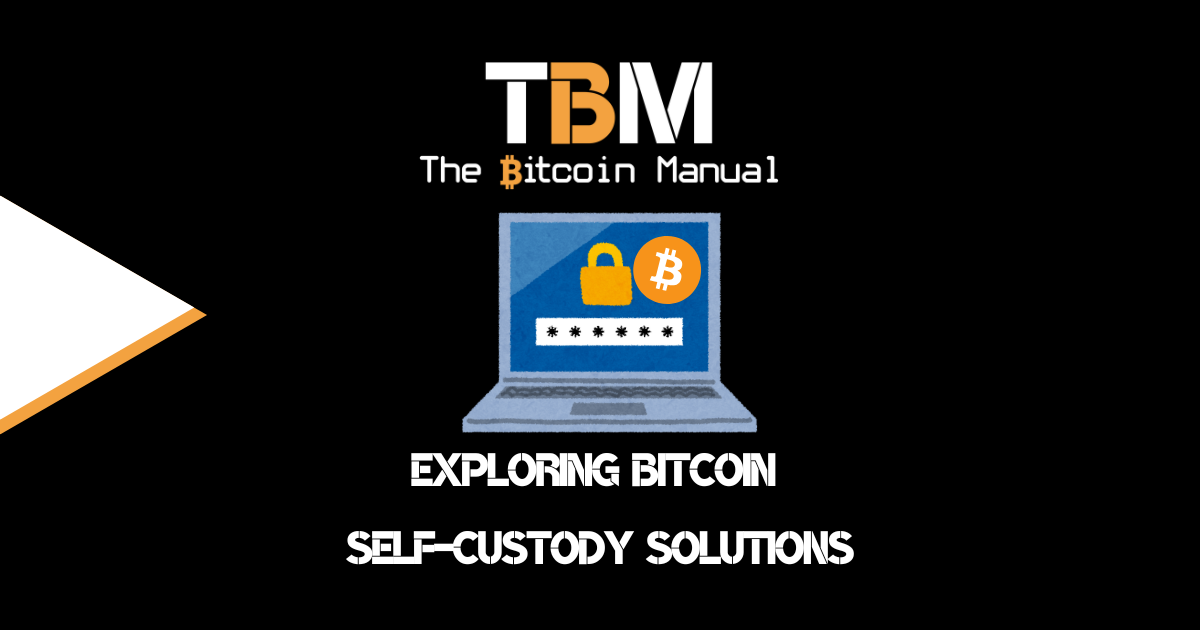Remember the heady days when Bitcoin influencers roamed Twitter like crusading knights, brandishing swords of righteousness against the insidious evils of altcoins and their massive marketing budgets?
Their rallying cries – “scams!” “pump-and-dumps!” “Ponzi schemes!” – echoed through the crypto sphere, a chorus of caution against the siren song of get-rich-quick schemes. It was a valiant fight, with many of the largest channels and social media personalities in Bitcoin banding together to argue against proponents selling forks of Bitcoin, new technology plays, new consensus mechanisms, pre-mined tokens and JPEG tokens.
Those days, however, are as bygone as dial-up internet, and the once herald, “boomer coin bros”, have become the very thing they hate.
If you’ve managed to stick around long enough, you might notice how, every few years, narratives can change, and the allure of fiat money and its incentives will see certain people follow the next big trend. It’s funny how this once-in-a-lifetime discovery of digital hard money, and all it could bring the world, can so quickly be passed on for the promise of unregulated securities trading and monkey JPEG collections as long as it has its roots stuck in Bitcoin.
Maybe Bitcoin wasn’t all that special; maybe they didn’t have real conviction in what they were saying?
Perhaps you were parroting the current thing to get views and attention; who knows?
No matter the reason, the secret is clearly out, and many are showing their true colours.
You either die a hero or live long enough to see yourself become the villain.
Enter the Great Influencer Flip, a spectacle of epic proportions as these very same champions of Bitcoin have, with a shameless pirouette, morphed into “Bitcoin-backed” or “Built on Bitcoin” shill lords, gleefully hawking the “next big thing” on the blockchain: Ordinals and Inscriptions.
Suddenly, the airwaves are abuzz with justifications that would make a used car salesman blush. Those once-fervent pronouncements about the ethical, financial, technical and regulatory failings of altcoins and NFTs are now walking back on those arguments.
Only a few years ago, creating a token out of thin air and selling it to the public was seen as a scam. Yet, this exact same act has been conveniently rebranded when Ordinals projects offer so-called “fair mints” as a method of suckering in the naive into purchasing valueless arbitrage data.
Through inscriptions, influencers can now promise the same alpha and land of milk and honey for degen token traders and NFT collectors, all nestled comfortably within an orange-washed wrapper.
From moral crusaders to Bitcoin’s trojan horses (A Glimpse into the Murky World of Ordinals and Pump-and-Dump Shenanigans)
The sudden call to justify creating tokens and NFTs for no other reason than dumping on a greater fool, but doing it on Bitcoin is enough to make your head spin. It’s a double standard so brazen, so unapologetically hypocritical that it could make a seasoned sceptic chuckle in disbelief. All those fiery sermons about the dangers of pump-and-dumps? Of the risks of market illiquidity? Of the manipulation of large bag holders, bot traders, and venture capital?
It makes me want to applaud the shit-coiners; at least they are consistent in their scamming and have not changed their narrative, and I have to give credit for that.
It’s funny how VCs were seen as a negative when they were funding all sorts of altcoin chains and failed token projects, but as soon as VC-funded Ordinals projects dangle fat marketing contracts before their hungry eyes.
These influencers are Tweeting a different tune.
All those previous arguments against tokens transformed into an afterthought, a footnote in the grand narrative of “innovation” and “free speech.” It’s a moral contortion so mind-boggling, so breathtaking in its audacity, that one can’t help but wonder – what happened to those once-gleaming halos?
Have they simply tarnished their reputation through an honest misunderstanding, or have they been traded in their audience for a stack of shiny short-term sats?

Follow the fiat money.
The truth, as it often does, lies somewhere in the murky depths of fiat incentives. These influencers, once self-proclaimed gatekeepers of Bitcoin righteousness, are, more often than not, simply opportunists riding the latest wave of hype.
They’re not champions of innovation; they’re mercenaries with keyboards and microphones, eagerly latching onto any trend that promises a quick buck. They’re not free speech warriors; they’re shills for the highest bidder, their voices tuned to the frequency of whoever coughs up the most sats. And they’re certainly not guardians of Bitcoin’s values; they’re the Trojan horses ushering in a new era of greed and speculation, all under the guise of “decentralisation” and “the free market.”
But the pivot isn’t simply a matter of individual actors changing hats. It’s a broader symptom of a deeper disease plaguing the cryptosphere: the commodification of everything.
In this twisted marketplace, even the very ideals that drew many to Bitcoin – decentralisation, anonymity, freedom – have become marketable assets, ripe for exploitation by those with enough marketing dollars and the right PR spin.
The thirst for exit liquidity is real
Ordinals and Inscriptions, in this context, are less of a new technology but more a set of tools aimed to migrate speculation during a new bull cycle and to avoid regulatory scrutiny. These projects are cleverly fashioned to capitalise on the insatiable thirst for profit and the relentless chase of the next big thing. The “innovation” touted by influencers is often little more than a veneer for blatant pump-and-dumps, a digital gold rush where early adopters get rich while the rest are left holding the proverbial empty blockchain bag.
Meanwhile, the influencers play their role in marketing this garbage in the hopes they can bag a piece of the venture funding flowing into the space. If they are seen as proponents of ordinals if they are seen to be growing an active audience, they make for a viable option to allocate marketing dollars to, and that’s the be-all and end-all of any influencer argument.
The “free speech” argument rings hollow when one considers the inherent censorship baked into any system where only the wealthy can afford to participate, where a select few make the deals, and where the system is rigged with different rules for different participants.
The intellectual curiosity argument is relatively shallow; when tokens have existed on blockchains in the past, NFT markets have existed for years. Even now that they exist on Bitcoin, the network itself doesn’t validate this type of transaction nor realise it exists. The Bitcoin network conducts its standard transactions, with third parties interpreting embedded data added into the chain along with the transaction.
The “free market” mantra crumbles to dust when faced with the reality of centralised exchanges, whale manipulation, and the insidious grip of VC funding.
The truth is that influencers are a marketing arm of venture capital-backed projects, and all these participants are looking for an ROI, with you, the ordinary pleb, targetted to the exit liquidity that provides those returns.
If influencers can sucker enough users to part with their sats and purchase arbitrary data embedded on the chain, everyone in the value chain before you win, while you and those like you end up the big loser.
The internet keeps receipts.
It’s in this murky landscape that the true battle lies – not between Bitcoin maximalists and altcoin enthusiasts, but between those who value the genuine principles of decentralisation and those who see it as a mere playground for their own enrichment.
The influencers, unfortunately, have chosen their side. They’ve become pawns in a game they don’t truly understand, shilling for projects they wouldn’t touch with a ten-foot pole if the allure of easy money didn’t blind them.
So, dear reader, beware of the pivoting influencer and trust no one. Always verify, do your own research, question their motives, listen to conflicting opinions and don’t let the orange Kool-Aid cloud your judgment. Because in the Wild West of Bitcoin, sometimes the most prominent con artists wear the shiniest cowboy hats and, with the most eloquent tongues, shamelessly shill you snake oil.




